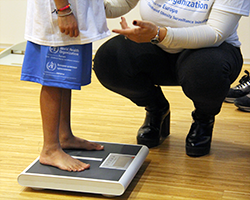Turkmenistan: new findings on street food, NCDs risk factors and childhood obesity

WHO
The WHO European Office for the Prevention and Control of Noncommunicable Diseases (NCDs) and the WHO Country Office in Turkmenistan launched the preliminary results of 3 surveys in the areas of street food, NCD risk factors and childhood obesity in Turkmenistan during a high-level meeting on 18–22 July 2018. The findings reveal some great successes, and also highlight some areas of concern.
Street food: fresh fruits and vegetables but high levels of salt and trans fats
FEEDCities is a survey that explores the nutritional composition of street food in various countries of the Commonwealth of Independent States. The latest survey, carried out in 2016, shows that Ashgabat, the country’s capital, offers a diverse range of foods including fresh fruits and vegetables.
However, many foods have less-than-ideal nutritional values and lists of ingredients. In particular, savoury snacks and other foods on offer, such as pastries, prepared salads, doner kebabs and hamburgers, were found to contain alarming levels of salt. The concentration of salt reaches, on average, 6.6 g per 100 g, far exceeding the WHO recommendations for salt intake of less than 5 g per day.
Another area for concern was the high levels of trans fats and saturated fats, especially in sweet pastries and snacks. Industrially produced trans fats are formed when fats and oils are modified by industrial processing techniques. Consumption of trans fats is associated with a range of adverse health conditions, including increased risk of cardiovascular diseases and some forms of cancer. The findings of the survey showed that levels trans fats per 100 g of total fat in cookies were 8 times that of the recommended limit.
Such high levels of salt and trans fats in food pose a risk for the population if consumed regularly.
NCDs risk factors: among the WHO European Region’s lowest levels of smoking and alcohol consumption
The STEPwise approach to surveillance (STEPS) survey is an internationally comparable, standardized and integrated surveillance tool through which countries can collect, analyse and disseminate core information on NCDs.
The recently conducted Turkmenistan STEPS survey showed that, in 2018, the prevalence of smoking and drinking in the country was very low. The findings revealed that an estimated 3.4% of the population smoked and 4.8% were current drinkers.
This represents a significant decrease for both indicators since 2013, when the STEPS survey was conducted in Turkmenistan for the first time. These rates of smoking and alcohol consumption are by far the lowest among all countries in the Region who have conducted STEPS surveys recently.
However, the findings also showed that approximately 7% of the population is not meeting the WHO physical activity recommendation (at least 150 minutes of moderate-intensity activity per week). While this is the lowest percentage among countries in the Region who have conducted STEPS surveys recently, the prevalence of overweight and obesity has remained unchanged over the last 5 years: approximately half of the population is overweight and 1 in 7 is obese.
Raised blood pressure was measured in 25.9% of the population, and rates were comparable in men and women. This value has increased since 2013, but still ranks as one the lowest among all countries who have conducted STEPS surveys recently. However, fewer people with raised blood pressure were receiving antihypertensive treatment in 2018 than in 2013.
Measurement of salt in spot urine samples showed that the average salt consumption was far higher than the WHO recommendation of less than 5 g per day.
Childhood obesity: high consumption of sugar and fats and low levels of physical activity
The WHO European Childhood Obesity Surveillance Initiative (COSI) is a unique system that for over 10 years has measured trends in overweight and obesity among children of primary school age. Turkmenistan conducted the study for the first time in 2015/2016. This provided high quality and comparable data on childhood overweight and obesity.
The study showed that around 1 in 10 boys and girls in primary schools are overweight, while 2.3% of girls and 3.6% of boys are obese. In addition, the consumption of sugary soft drinks – one of the main contributors to childhood obesity – is very high. So, too, are levels of consumption of foods high in sugar and fats, such as cakes, cookies, doughnuts and pies.
The study also showed that levels of physical activity are relatively low, with children spending little time engaging in sports and active play.
Both boys and girls in the capital have higher risks of being overweight and obese than in other regions.
Conclusions and recommendations
Overall, Turkmenistan should be commended for these results, and for its dedication to protecting the health of its population through primary prevention efforts and support for healthy lifestyles.
However, there are some areas for improvement. WHO has identified several sets of recommendations that would help the country to capitalize on its successes and keep health risk levels low. The recommendations provide a series of specific and concrete actions to:
- reduce NCD-related mortality by focusing on hypertension prevention and control and on reduction of salt intake, as well as by introducing community-level health promotion strategies to reduce the high level of obesity;
- enhance the quality of widely available food by implementing a ban on trans fats, enforcing maximum salt content limits, and mandating nutrition declarations and labelling on all packaged foods for salt/sodium, total saturated fat and sugars; and
- improve children’s nutrition by implementing measures and policies to strengthen school nutrition and physical activity programmes, to reduce consumption of sugar-sweetened beverages and to strengthen collaboration with stakeholders outside the health sector.



